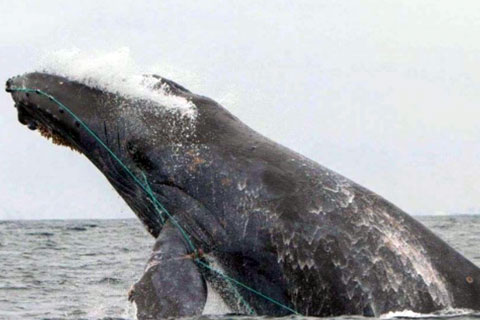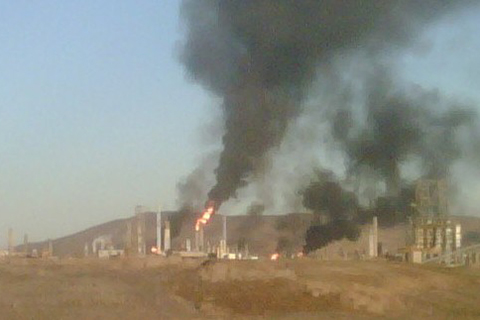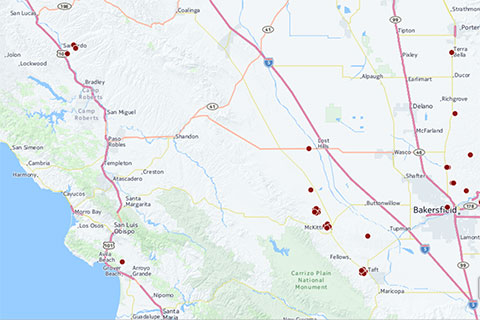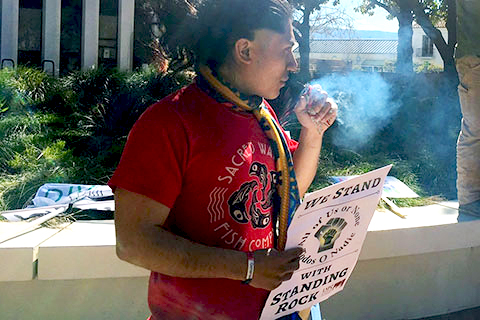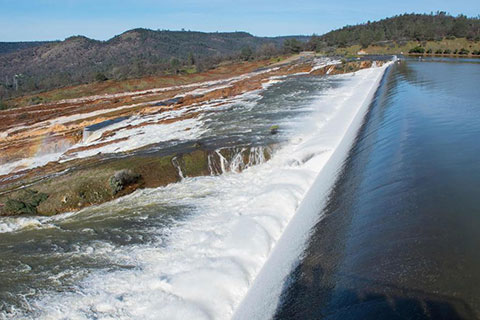Feature Archives
Mon Apr 3 2017
Whale Entanglements Break Record for Third Straight Year
Commercial Dungeness crab gear entangled a record number of whales in 2016, contributing to a third straight record-breaking year for entanglements along the U.S. West Coast, according to information released this week by the National Marine Fisheries Service. While whale entanglements are reported up and down the coast, the Monterey Bay National Marine Sanctuary has recently seen the highest number of entanglements. “Whales are suffering slow, painful deaths because there are too many crab traps in Monterey Bay,” said Catherine Kilduff of the Center for Biological Diversity.
Mon Mar 20 2017 (Updated 03/23/17)
Landmark Report Reveals Hundreds of Native Bee Species Sliding Toward Extinction
In the first comprehensive review of the more than 4,000 native bee species in North America and Hawaii, the Center for Biological Diversity has found that more than half the species with sufficient data to assess are declining. Nearly 1 in 4 is imperiled and at increasing risk of extinction. The widespread decline of European honeybees has been well documented in recent years, but until now much less has been revealed about the 4,337 native bee species in North America and Hawaii. The new analysis reveals that more than 700 species are in trouble from a range of serious threats.
Thu Mar 2 2017 (Updated 03/04/17)
The Health of the Bay Area Is at Stake Say Whistleblowers
Two Bay Area Air Quality Management District employees charge in a new lawsuit that they were bullied, retaliated against, and fired for exposing the illegal destruction of agency documents that are required to be maintained for a record of the violations of air pollution laws by corporations. They say they had tried to stop the destruction of the documents but that the agency's top managers continued to engage in destroying citations, compliance records, and settlement agreements for air pollution control violations by major companies like Chevron, Shell, Tosco, Pacific Steel Casting, and many other companies.
Wed Feb 15 2017 (Updated 03/21/17)
Monarch Butterfly Population Drops by Nearly One Third
The annual overwintering count of monarch butterflies released on February 9 confirms Monarch numbers fell by nearly one-third from last year’s count, indicating an ongoing risk of extinction for America’s most well-known butterfly. Scientists report that this year’s population is down by 27 percent from last year’s count, and down by more than 80 percent from the mid-1990s. A survey of monarch butterflies overwintering in California shows that the Western population has not rebounded. On the West Coast of California, key sites such as Pismo Beach and Natural Bridges saw lower populations this year than in the prior year.
Tue Feb 14 2017 (Updated 05/25/18)
Trump Administration Waives Water-Protection Rule for California Oilfields
The Trump administration this week granted requests from Gov. Jerry Brown's regulators to exempt three aquifers in California's Kern County from the federal Safe Drinking Water Act. Approval of these "aquifer exemption" applications by the Environmental Protection Agency gives oil companies permission to dump contaminated waste fluid into these underground water supplies. California officials plan to submit dozens of additional exemption applications for other aquifers across the state, including underground water sources in Alameda, Monterey, Ventura, Kern and other counties.
Mon Feb 13 2017 (Updated 02/14/17)
Marchers in Palo Alto Demand Banks Defund DAPL
Hundreds of demonstrators took their Rolling March and Rally through downtown Palo Alto on February 11. They hit up eight banks that are responsible for helping to fund the Dakota Access Pipeline. Things got started in front of City Hall with a rally featuring indigenous speakers Dr. Maria Michael, Hartman Deetz, and Delphine Red Shirt amongst others. Marchers then made their way to Citibank, Morgan Stanley, Comerica, Bank of America, Union Bank, HSBC, Wells Fargo, and Chase banks. To the end demonstrators cried out "Mni Wiconi - Water is Life!"
Mon Feb 13 2017 (Updated 02/14/17)
Lake Oroville Surges Over Emergency Spillway for First Time in History
Water from Lake Oroville flowed over the emergency spillway at Oroville Dam for the first time in the reservoir's 48-year history after the water level exceeded 901 feet in elevation on February 11. The water slowly began to flow over the concrete weir of the auxiliary spillway, down a hillside and into the Feather River. After saying the situation was stable and public safety was not threatened, state officials reversed course and issued evacuation orders late in the afternoon of February 12. On February 13, state officials would give no timeline on when the 188,000 evacuees can return to their homes.


